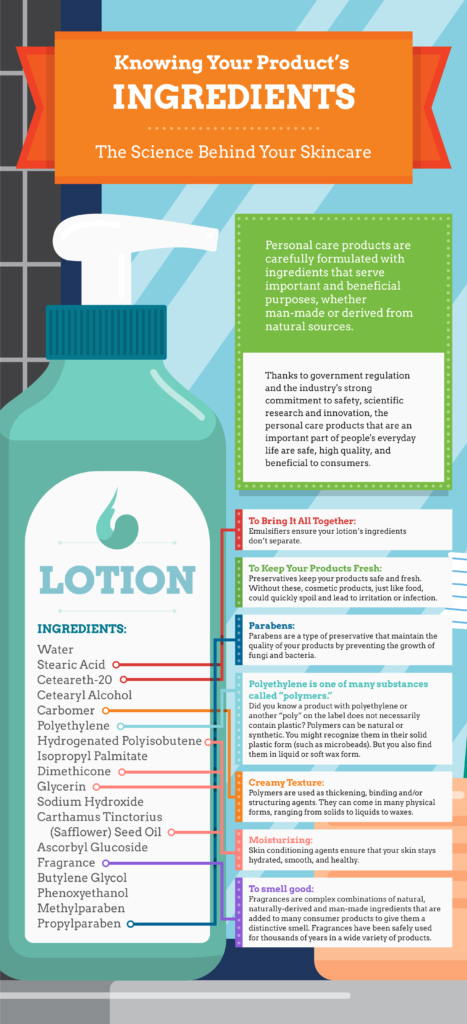Safety is the most critical consideration when caring for yourself and your family. Nothing else matters if you can’t believe in a product and rely on it to do what it says. Product safety is a top priority of cosmetics and personal care products companies, and everything they do is grounded in the best science available. In the U.S., cosmetics and personal care products are regulated by the Food & Drug Administration (FDA) under the Food, Drug & Cosmetic Act (FD&C Act), the Fair Packaging & Labeling Act (FPLA) and the Modernization of Cosmetics Regulation Act (MoCRA) of 2022.
The following resources provide detailed information about the scientific processes and regulatory authority behind the safety of cosmetics and personal care products.
- How Cosmetics Are Regulated in the U.S.
- Cosmetics and personal care products companies take their responsibility to people and the planet seriously. They are committed to upholding strict FDA regulations and often go beyond what the law requires with additional consumer safety measures.
- FDA Regulatory Oversight
- Strong federal safety requirements exist for cosmetics and personal care products sold in the United States. The law requires manufacturers to substantiate the safety of every product and its ingredients before going to market. The FDA and Attorney General can take action against any company that markets an unsafe product. MoCRA also gives the FDA several new authorities, including initiating mandatory product recalls, to further protect consumers.
- Global Cosmetics Regulation
- Cosmetics and personal care products manufacturers around the world work to develop safe products that help you look and feel your best. While different countries and regions use different measures, they all share one common goal: ensuring products and ingredients are safe and effective.
- Cosmetic Ingredient Review (CIR)
- The Expert Panel for Cosmetic Ingredient Safety is an independent, nonprofit scientific body established in 1976 to assess the safety of cosmetics ingredients used in the U.S. through Cosmetic Ingredient Review program.
- Consumer Commitment Code
- In 2007, Personal Care Products Council member companies created a voluntary Consumer Commitment Code (Code) to strengthen practices already in place for cosmetics and personal care products companies and incorporate new practices. The enactment of MoCRA made most of these voluntary practices mandatory.
- Cosmetics Ingredient Labeling
- History of Cosmetics and Personal Care Products
- Civilizations have used cosmetics for centuries, for example in religious rituals, to enhance beauty and promote good health and hygiene. Learn more about these products from the ancient Egyptians in 10,000 BC through modern developments in the United States today.
Science & Safety Information
- Science & Safety Information
- Factors Considered in Safety Evaluation
- Product Safety in the Marketplace
- Cosmetics Ingredient Labeling
There is nothing more important than safety. If you can’t believe in a product or rely on it to do what it says, then nothing else matters. That’s why safety is a top priority for cosmetics and personal care products companies. The development of new cosmetics or personal care products involves numerous scientific disciplines. Chemists, biochemists, microbiologists, toxicologists, product formulators, engineers, packaging scientists, quality assurance professionals – and many more scientific and technical experts – work together to ensure the safety and efficacy of every new product brought to market.
Safe by Design – Right from the Start
Safety is considered throughout the product formulation process – from concept to design to finished product. It is considered at every stage of the development process – for every ingredient, every package, and every product – knowing products will be used by millions of individuals and families around the world.
DID YOU KNOW: All cosmetics and personal care product companies are required by federal law to demonstrate the safety of products and ingredients before they go to market.

Scientific advances and frequent changes in consumer preferences all play a role in how new products are developed. When a company creates a new product, it is guided by a complex list of scientific factors to make sure the product is safe for everyone who uses it.
Choosing Safe Ingredients
The first step is to make sure all the ingredients are safe on their own as well as when combined together. Part of this process is considering how, and how often, consumers use the product. It starts with a healthy dose of skepticism about the safety of all new ingredients. If ingredients cannot be proven to be cannot establish their safety and benefit to consumers, we will not use them.
Safety evaluation includes an assessment of an ingredient’s potential to cause both short-term (i.e., acute) and long-term effects (i.e., chronic, cumulative) that may only show up after repeated exposure. Scientists consider an ingredient’s potential for causing eye or skin irritation, allergic reactions, reproductive or fetal development effects, harm to the body’s DNA (i.e., genotoxicity), and cancer (i.e., carcinogenicity).
Defining a Safe Range

You may have heard the saying, “the dose makes the poison.” Water, for instance, is not only safe but essential to health and wellbeing. Drinking 10 liters or more, however, could result in “water intoxication” – a potentially life-threatening condition. Similarly, electricity at low levels powers our heart and brain, as well as 9-volt batteries. But an electrical current millions of times more powerful, like a bolt of lightning, can cause death.
Identifying potentially harmful scenarios and then determining a safe range for ingredients in cosmetics and personal care products is the next step in the safety assessment process.
To do this, a margin of safety must first be determined. Scientists set the maximum amount allowed in a product at a level many times lower than the amount which might cause harm. The difference, called the “safety factor,” may be a hundred-fold, a thousand-fold or even a million-fold, depending on the ingredient and potential for harm.
Cosmetics and personal care products companies do same assessment on every single ingredient used in products and avoid unsafe ranges. If there is not enough information to establish a safe range, companies will remove the ingredient from consideration, or investigate it further to produce additional data. This process is standardized across the Food and Drug Administration (FDA), Environmental Protection Agency (EPA), European Union (EU), Health Canada and other organizations that evaluate safety.
Determining Safe Product Use
Cosmetics and personal care products companies take seriously their commitment to people and the planet. After ingredients are evaluated to confirm their real-world use is safe for both consumers and the environment, developers work with engineers and scientists to test how the new product reacts to light, temperature and transportation. This helps ensure products will remain stable and perform as expected throughout their lifetime. They also review which preservatives will work best, to make sure products don’t grow bacteria or other microorganisms, and how the packaging might affect the product’s shelf life. They look at whether the new formula can be manufactured safely in an existing facility and that quality is not compromised no matter where in the world the product is made or used. If the product formula is not safe, it will be reformulated, or not marketed.
Companies must ensure products comply with all government regulations. In the U.S., cosmetics and personal care products are regulated by the Food & Drug Administration (FDA) under the Food, Drug & Cosmetics Act and the Fair Packaging & Labeling Act. Sunscreens are considered over-the-counter (or OTC) drugs and are regulated accordingly. Each company is required to label products with safety information, including the list of ingredients and how best to use the product.
Cumulative Exposure

The average consumer uses multiple cosmetics and personal care products each day. Therefore, the assessment of cumulative exposure to product ingredients from multiple sources is an important component in the overall assessment of product safety. The methodology used to do safety assessments is very conservative, and includes the following steps:
- Assuming the highest possible concentration of an ingredient that would be used in a particular product type
- Assuming the highest possible consumer exposure during product use, etc.
- Adding additional MOS between what consumers might be exposed to and the levels that caused no harmful effects in safety tests, known as the No Observed Adverse Effect Level (NOAEL).
This process results in very large MOS – often hundreds- or thousands-fold – more than accounting for any potential concerns about cumulative exposure.
Post-Market Surveillance
Bringing a product from concept to market can take two to three years, or longer. Even after the product is available for sale, the commitment to safety and quality is far from over. Regulators and manufacturers constantly monitor the marketplace for reports of unexpected reactions to a product and other consumer feedback. As science advances and consumer preferences change, companies continually innovate to ensure the products – in stores, online and in your home – meet your expectations for safety and high quality.
Cosmetics and personal care products companies utilize a multi-tiered scientific approach to extensively evaluate the safety of products and their ingredients. Key components of this strict and methodical safety process include:
- Reviews of Latest, Up-To-Date Safety Research
As part of the product evaluation process, numerous scientific research sources are examined for the latest, most up-to-date ingredient safety information. These sources include extensive scientific reviews by the Expert Panel for Cosmetic Ingredient Safety, as well as reviews of ingredients by other sources; information and data from cosmetics ingredient suppliers; published data in the scientific literature; and government sources, including the U.S. Food and Drug Administration (FDA), National ToxicologyToxicology is the study of the adverse effects of chemical and physical agents on living organisms. Program, National Cancer Institute, and other government entities and databases.
- Determinations of Possible Ingredient Toxicology
Safety evaluations take into consideration a number of key factors, including ingredient function and use concentration; degree of chemical purity and stability; and potential for ingredients to be absorbed through the skin and/or mucous membranes, or via oral ingestion or inhalation. Assessment for potential adverse effects includes: evaluation of exposure to cosmetics ingredients for short, intermediate or long periods of time (acute, subchronic and chronic systemic toxicity); skin irritation and skin allergy; photoirritation and photoallergy (irritation and sensitization caused after exposure to sunlight); and determination of the potential for ingredients to adversely affect the body’s genetic material (genotoxicity), cause cancer (carcinogenicity), or negatively affect reproduction and/or fetal development.
- Evaluation & Testing of Human Health Impacts
Following a thorough review of each ingredient in a formulation, additional safety data on the finished product are reviewed. This may include cell culture (in vitroExperiments performed in a test tube or another artificial, controlled environment, rather than in a whole animal.) and clinical (human) tests conducted on the final product and products similar in composition. The potential for ingredient interactions within the product leading to unexpected adverse effects is also evaluated. Confirmatory testing of product compatibility and acceptability on human volunteers (clinical testing) is often undertaken with informed consent and the appropriate safeguards to detect any undesirable effects that could occur.
- Examination of Cumulative Exposure to the Human Body
The average consumer uses multiple cosmetics and personal care products each day. Therefore, the assessment of cumulative exposure to product ingredients from multiple sources is an important component in the overall assessment of product safety. It is also important to take into account inadvertent (secondary) exposures such as inhalation (from products such as hair spray), or ingestion (from products such as lipsticks), etc.
Factors to be considered in determining exposure levels for cosmetics and personal care products and their ingredients include product type; amount used per application; frequency and method of application; site of body contact; duration of product contact; concentration of individual ingredients in the final product; use by sensitive subpopulations such as infants, the elderly and pregnant women; possible conditions of foreseeable misuse; and external factors such as variation in use related to weather, local or temporal habits, trends, and cultural considerations.
- Testing & Evaluation Performed by Scientists Trained in Product Safety
To ensure the reliability of testing, cosmetics studies and their results are designed, monitored and evaluated by scientists trained in both toxicology and safety evaluation, and who have a fundamental understanding of cosmetics, personal care and fragrance products and of the tests being used.
Product Safety Monitoring Continues Even After Sale
The commitment to safety and quality doesn’t end when a product is available for sale. Regulators and manufacturers constantly monitor the marketplace for reports of unexpected reactions to a product and other consumer feedback to make sure products – in stores, online and in your home – meet your expectations for safety and high quality.
Cosmetics and personal care product companies have established post-market surveillance processes for the identification of potential safety issues related to their products. Such systems help identify consumer use patterns, such as alternate uses or product combinations, that may contribute to adverse events. These processes include regular surveys of consumer contacts received by a marketer or manufacturer, either through toll-free 1-800 numbers on packages or direct correspondence. Trend analyses of contact data – including evaluations of frequency and severity of adverse events, as well as comparison of these trends with historical information for other comparable products – represent valuable mechanisms for identifying safety-related concerns. Although serious and unexpected adverse reactions to cosmetics and personal care products are extremely rare, manufacturers must report knowledge of any such instances to the U.S. Food & Drug Administration (FDA), via the Adverse Events Reporting System.
The Scientists Behind Product Safety
Numerous specially trained scientists are involved in the design, development and manufacture of cosmetics and personal care products, including:
Some of the scientists involved in the product development and safety process include:
- Toxicologists, who evaluate ingredients and finished products to establish their safety for consumers during usage
- Microbiologists, who establish product preservation requirements and monitor manufacturing to ensure finished product integrity
- Analytical chemists, who perform chemical evaluations of ingredients and finished products to determine purity and other properties
- Formulators, who develop new and improved products and set product standards and specifications
- Science information specialists, who retrieve information, such as scientific articles and patents, relevant to product development and safety
- Manufacturing engineers, who develop manufacturing procedures and oversee production of the final product
- Technical packaging specialists, who create improved ways of applying, dispensing and packaging products
- Quality assurance professionals, who test components and products to meet ingredient and finished product specifications
- Regulatory specialists, who ensure products meet all labeling requirements and comply with all governmental regulations
- Consumer affairs professionals, who conduct consumer research and testing prior to product marketing and track issues that may arise
While each of these scientists contributes to the safety profile of cosmetics and personal care products, it is the specific role of the toxicologist to design and interpret the tests that assess the safety of products and their ingredients.
Labeling Helps Consumers Make Informed Choices About Cosmetics
Everyone deserves the right to know what’s in their products. Not only do they have a right to know, but they also have a right to understand.
Proper labeling is an important aspect of marketing cosmetics and personal care products. Labeling helps inform consumers of a product’s intended use and any related warnings, ingredients and net quantity of contents, and where they are manufactured or distributed. The U.S. Food and Drug Administration (FDA) regulates cosmetics labeling under the authority of the Food, Drug, and Cosmetic Act (FD&C Act), Fair Packaging and Labeling Act (FPLA) and Modernization of Cosmetics Regulation Act (MoCRA) of 2022. These laws and related regulations protect consumers from health hazards and deceptive practices and help them make informed decisions about the products they purchase. Federal regulations require that product labels list ingredients in descending order of concentration.
For more information about how the Personal Care Products Council’s (PCPC) member companies have historically gone beyond what was required by law to promote greater transparency and disclosure, visit PCPC’s website.
It is helpful to understand what labeling terms mean:
- Labeling: Labeling isn’t just what’s on the bottle or box, but also any other written, printed or graphic material on or accompanying a product [FD&C Act, sec. 201(m); 21 U.S.C. 321(m)].
- Principal Display Panel (PDP): This part of the label is where the essential product information is located and is easy to read and understand before a consumer buys the product [21 CFR 701.10]. It must include the following:
- Product identity (what it is)
- Net contents (how much is in the package)
- Ingredient declaration (what it’s made of)
- Any required warning labels
- Information Panel: This panel must also be placed where a consumer can easily find it. It has other important information like the list of ingredients in order of quantity, how to use the product, warning and caution statements, and the manufacturer’s name and address.
As part of the prohibition against false or misleading information, no cosmetics or personal care products may be labeled or advertised with statements suggesting the FDA has approved the product. This applies even if the manufacturing establishment is registered or the product is on file with FDA’s Voluntary Cosmetic Registration Program (VCRP). All labeling information required by U.S. law or regulation must be in English. The only exception to this rule is for products distributed solely in a U.S. territory where a different language is predominant, such as Puerto Rico. If the label contains any representation in a foreign language, all label information required under the FD&C Act must also appear in that language [21 CFR 701.2(b)]
The Principal Display Panel is the part of the label that consumers are most likely to look at. It must include:
- An identity statement indicating how a product will be used, with either the common or usual name, a descriptive name, a fanciful name understood by the public, or an illustration [21 CFR 701.11].
- An accurate statement of the net quantity of contents, including weight, measure, numerical count, or a combination of numerical count and weight or measure [21 CFR 701.13].
The following information must appear on an Information Panel:
- Distributor statement: If the name and address are not those of the manufacturer, the label must say “Manufactured for…” or “Distributed by…” [21 CFR 701.12].
- Material facts: Material facts are the directions for using a product safely. If that information is not on the label, is incorrect or misleading, the product’s label is misbranded. [21 CFR 1.21].
- Warning and caution statements: These statements are related to specific products and must be placed where they are easily seen and read. [21 CFR part 700]. Products that may be hazardous to consumers must have label warnings [21 CFR 740.1]. For example, aerosols products require specific warnings.
- Ingredients: Products sold to consumers—even if it has “For professional use only—the ingredients must appear on an information panel, in descending order of quantity. [21 CFR 701.3]. If the product is also an over-the-counter (OTC) drug, such as sunscreens, also must list separately “active” and “inactive” ingredients in alphabetical order.
For more information:
- Knowing Your Product’s Ingredients, an infographic about ingredients and labeling
- Reading the Label of Your Favorite Beauty Product, a blog post from PCPC Chief Scientist, Alexandra Kowcz
- Sunscreens: How to Read a Label, Expert Tips, etc.
